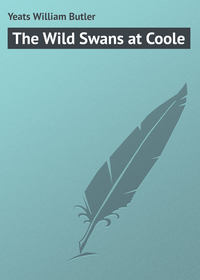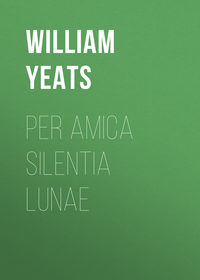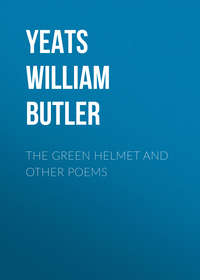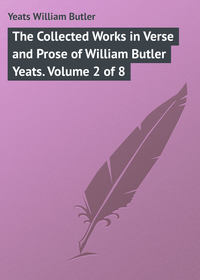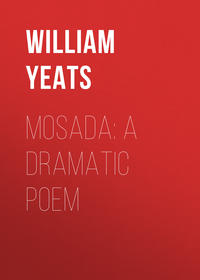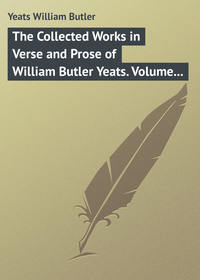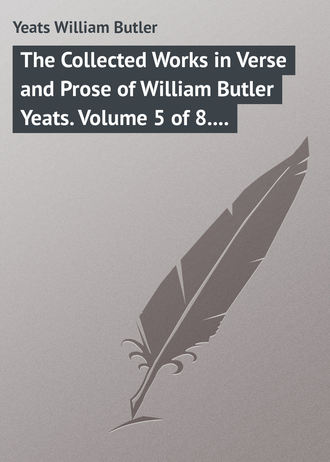
The Collected Works in Verse and Prose of William Butler Yeats. Volume 5 of 8. The Celtic Twilight and Stories of Red Hanrahan
She is dead now herself, but many still living remember her. She was, I believe, for a time a servant or else a kind of pensioner of some relations of my own.
Sometimes those who are carried off are allowed after many years – seven usually – a final glimpse of their friends. Many years ago a woman vanished suddenly from a Sligo garden where she was walking with her husband. When her son, who was then a baby, had grown up he received word in some way, not handed down, that his mother was glamoured by faeries, and imprisoned for the time in a house in Glasgow and longing to see him. Glasgow in those days of sailing-ships seemed to the peasant mind almost over the edge of the known world, yet he, being a dutiful son, started away. For a long time he walked the streets of Glasgow; at last down in a cellar he saw his mother working. She was happy, she said, and had the best of good eating, and would he not eat? and therewith laid all kinds of food on the table; but he, knowing well that she was trying to cast on him the glamour by giving him faery food, that she might keep him with her, refused, and came home to his people in Sligo.
Some five miles southward of Sligo is a gloomy and tree-bordered pond, a great gathering-place of water-fowl, called, because of its form, the Heart Lake. It is haunted by stranger things than heron, snipe, or wild duck. Out of this lake, as from the white square stone in Ben Bulben, issues an unearthly troop. Once men began to drain it; suddenly one of them raised a cry that he saw his house in flames. They turned round, and every man there saw his own cottage burning. They hurried home to find it was but faery glamour. To this hour on the border of the lake is shown a half-dug trench – the signet of their impiety. A little way from this lake I heard a beautiful and mournful history of faery kidnapping. I heard it from a little old woman in a white cap, who sings to herself in Gaelic, and moves from one foot to the other as though she remembered the dancing of her youth.
A young man going at nightfall to the house of his just married bride, met in the way a jolly company, and with them his bride. They were faeries, and had stolen her as a wife for the chief of their band. To him they seemed only a company of merry mortals. His bride, when she saw her old love, bade him welcome, but was most fearful lest he should eat the faery food, and so be glamoured out of the earth into that bloodless dim nation, wherefore she set him down to play cards with three of the cavalcade; and he played on, realizing nothing until he saw the chief of the band carrying his bride away in his arms. Immediately he started up, and knew that they were faeries; for slowly all that jolly company melted into shadow and night. He hurried to the house of his beloved. As he drew near came to him the cry of the keeners. She had died some time before he came. Some noteless Gaelic poet had made this into a forgotten ballad, some odd verses of which my white-capped friend remembered and sang for me.
Sometimes one hears of stolen people acting as good genii to the living, as in this tale, heard also close by the haunted pond, of John Kirwan of Castle Hacket. The Kirwans8 are a family much rumoured of in peasant stories, and believed to be the descendants of a man and a spirit. They have ever been famous for beauty, and I have read that the mother of the present Lord Cloncurry was of their tribe.
John Kirwan was a great horse-racing man, and once landed in Liverpool with a fine horse, going racing somewhere in middle England. That evening, as he walked by the docks, a slip of a boy came up and asked where he was stabling his horse. In such and such a place, he answered. ‘Don’t put him there,’ said the slip of a boy; ‘that stable will be burnt to-night.’ He took his horse elsewhere, and sure enough the stable was burnt down. Next day the boy came and asked as reward to ride as his jockey in the coming race, and then was gone. The race-time came round. At the last moment the boy ran forward and mounted, saying, ‘If I strike him with the whip in my left hand I will lose, but if in my right hand bet all you are worth.’ ‘For,’ said Paddy Flynn, who told me the tale, ‘the left arm is good for nothing. I might go on making the sign of the cross with it, and all that, come Christmas, and a banshee, or such like, would no more mind than if it was that broom.’ Well, the slip of a boy struck the horse with his right hand, and John Kirwan cleared the field out. When the race was over, ‘What can I do for you now?’ said he. ‘Nothing but this,’ said the boy: ‘my mother has a cottage on your land – they stole me from the cradle. Be good to her, John Kirwan, and wherever your horses go I will watch that no ill follows them; but you will never see me more.’ With that he made himself air, and vanished.
Sometimes animals are carried off – apparently drowned animals more than others. In Claremorris, Galway, Paddy Flynn told me, lived a poor widow with one cow and its calf. The cow fell into the river, and was washed away. There was a man thereabouts who went to a red-haired woman – for such are supposed to be wise in these things – and she told him to take the calf down to the edge of the river, and hide himself and watch. He did as she had told him, and as evening came on the calf began to low, and after a while the cow came along the edge of the river and commenced suckling it. Then, as he had been told, he caught the cow’s tail. Away they went at a great pace, across hedges and ditches, till they came to a royalty (a name for the little circular ditches, commonly called raths or forts, that Ireland is covered with since Pagan times). Therein he saw walking or sitting all the people who had died out of his village in his time. A woman was sitting on the edge with a child on her knees, and she called out to him to mind what the red-haired woman had told him, and he remembered she had said, ‘Bleed the cow.’ So he stuck his knife into the cow and drew blood. That broke the spell, and he was able to turn her homeward. ‘Do not forget the spancel,’ said the woman with the child on her knees; ‘take the inside one.’ There were three spancels on a bush; he took one, and the cow was driven safely home to the widow.
There is hardly a valley or mountain-side where folk cannot tell you of some one pillaged from amongst them. Two or three miles from the Heart Lake lives an old woman who was stolen away in her youth. After seven years she was brought home again for some reason or other, but she had no toes left. She had danced them off. Many near the white stone door in Ben Bulben have been stolen away.
It is far easier to be sensible in cities than in many country places I could tell you of. When one walks on those grey roads at evening by the scented elder-bushes of the white cottages, watching the faint mountains gathering the clouds upon their heads, one all too readily discovers, beyond the thin cobweb veil of the senses, those creatures, the goblins, hurrying from the white square stone door to the north, or from the Heart Lake in the south.
THE UNTIRING ONES
It is one of the great troubles of life that we cannot have any unmixed emotions. There is always something in our enemy that we like, and something in our sweetheart that we dislike. It is this entanglement of moods which makes us old, and puckers our brows and deepens the furrows about our eyes. If we could love and hate with as good heart as the faeries do, we might grow to be long-lived like them. But until that day their untiring joys and sorrows must ever be one-half of their fascination. Love with them never grows weary, nor can the circles of the stars tire out their dancing feet. The Donegal peasants remember this when they bend over the spade, or sit full of the heaviness of the fields beside the griddle at nightfall, and they tell stories about it that it may not be forgotten. A short while ago, they say, two faeries, little creatures, one like a young man, one like a young woman, came to a farmer’s house, and spent the night sweeping the hearth and setting all tidy. The next night they came again, and while the farmer was away, brought all the furniture up-stairs into one room, and having arranged it round the walls, for the greater grandeur it seems, they began to dance. They danced on and on, and days and days went by, and all the country-side came to look at them, but still their feet never tired. The farmer did not dare to live at home the while; and after three months he made up his mind to stand it no more, and went and told them that the priest was coming. The little creatures when they heard this went back to their own country, and there their joy shall last as long as the points of the rushes are brown, the people say, and that is until God shall burn up the world with a kiss.
But it is not merely faeries who know untiring days, for there have been men and women who, falling under their enchantment, have attained, perhaps by the right of their God-given spirits, an even more than faery abundance of life and feeling. It seems that when mortals have gone amid those poor happy leaves of the Imperishable Rose of Beauty, blown hither and thither by the winds that awakened the stars, the dim kingdom has acknowledged their birthright, perhaps a little sadly, and given them of its best. Such a mortal was born long ago at a village in the south of Ireland. She lay asleep in a cradle, and her mother sat by rocking her, when a woman of the Sidhe (the faeries) came in, and said that the child was chosen to be the bride of the prince of the dim kingdom, but that as it would never do for his wife to grow old and die while he was still in the first ardour of his love, she would be gifted with a faery life. The mother was to take the glowing log out of the fire and bury it in the garden, and her child would live as long as it remained unconsumed. The mother buried the log, and the child grew up, became a beauty, and married the prince of the faeries, who came to her at nightfall. After seven hundred years the prince died, and another prince ruled in his stead and married the beautiful peasant girl in his turn; and after another seven hundred years he died also, and another prince and another husband came in his stead, and so on until she had had seven husbands. At last one day the priest of the parish called upon her, and told her that she was a scandal to the whole neighbourhood with her seven husbands and her long life. She was very sorry, she said, but she was not to blame, and then she told him about the log, and he went straight out and dug until he found it, and then they burned it, and she died, and was buried like a Christian, and everybody was pleased. Such a mortal too was Clooth-na-bare,9 who went all over the world seeking a lake deep enough to drown her faery life, of which she had grown weary, leaping from hill to lake and lake to hill, and setting up a cairn of stones wherever her feet lighted, until at last she found the deepest water in the world in little Lough Ia, on the top of the Birds’ Mountain at Sligo.
The two little creatures may well dance on, and the woman of the log and Clooth-na-bare sleep in peace, for they have known untrammelled hate and unmixed love, and have never wearied themselves with ‘yes’ and ‘no,’ or entangled their feet with the sorry net of ‘maybe’ and ‘perhaps.’ The great winds came and took them up into themselves.
EARTH, FIRE AND WATER
Some French writer that I read when I was a boy, said that the desert went into the heart of the Jews in their wanderings and made them what they are. I cannot remember by what argument he proved them to be even yet the indestructible children of earth, but it may well be that the elements have their children. If we knew the Fire Worshippers better we might find that their centuries of pious observance have been rewarded, and that the fire has given them a little of its nature; and I am certain that the water, the water of the seas and of lakes and of mist and rain, has all but made the Irish after its image. Images form themselves in our minds perpetually as if they were reflected in some pool. We gave ourselves up in old times to mythology, and saw the Gods everywhere. We talked to them face to face, and the stories of that communion are so many that I think they outnumber all the like stories of all the rest of Europe. Even to-day our country people speak with the dead and with some who perhaps have never died as we understand death; and even our educated people pass without great difficulty into the condition of quiet that is the condition of vision. We can make our minds so like still water that beings gather about us that they may see, it may be, their own images, and so live for a moment with a clearer, perhaps even with a fiercer life because of our quiet. Did not the wise Porphyry think that all souls come to be born because of water, and that ‘even the generation of images in the mind is from water’?
1902.THE OLD TOWN
I fell, one night some fifteen years ago, into what seemed the power of faery.
I had gone with a young man and his sister – friends and relations of my own – to pick stories out of an old countryman; and we were coming home talking over what he had told us. It was dark, and our imaginations were excited by his stories of apparitions, and this may have brought us, unknown to us, to the threshold, between sleeping and waking, where Sphinxes and Chimæras sit open-eyed and where there are always murmurings and whisperings. I cannot think that what we saw was an imagination of the waking mind. We had come under some trees that made the road very dark, when the girl saw a bright light moving slowly across the road. Her brother and myself saw nothing, and did not see anything until we had walked for about half-an-hour along the edge of the river and down a narrow lane to some fields where there was a ruined church covered with ivy, and the foundations of what was called “the Old Town,” which had been burned down, it was said, in Cromwell’s day. We had stood for some few minutes, so far as I can recollect, looking over the fields full of stones and brambles and elder-bushes, when I saw a small bright light on the horizon, as it seemed, mounting up slowly towards the sky; then we saw other faint lights for a minute or two, and at last a bright flame like the flame of a torch moving rapidly over the river. We saw it all in such a dream, and it seems all so unreal, that I have never written of it until now, and hardly ever spoken of it, and even when thinking, because of some unreasoning impulse, I have avoided giving it weight in the argument. Perhaps I have felt that my recollections of things seen when the sense of reality was weakened must be untrustworthy. A few months ago, however, I talked it over with my two friends, and compared their somewhat meagre recollections with my own. That sense of unreality was all the more wonderful because the next day I heard sounds as unaccountable as were those lights, and without any emotion of unreality, and I remember them with perfect distinctness and confidence. The girl was sitting reading under a large old-fashioned mirror, and I was reading and writing a couple of yards away, when I heard a sound as if a shower of peas had been thrown against the mirror, and while I was looking at it I heard the sound again, and presently, while I was alone in the room, I heard a sound as if something much bigger than a pea had struck the wainscoting beside my head. And after that for some days came other sights and sounds, not to me but to the girl, her brother, and the servants. Now it was a bright light, now it was letters of fire that vanished before they could be read, now it was a heavy foot moving about in the seemingly empty house. One wonders whether creatures who live, the country people believe, wherever men and women have lived in earlier times, followed us from the ruins of the old town? or did they come from the banks of the river by the trees where the first light had shone for a moment?
1902.THE MAN AND HIS BOOTS
There was a doubter in Donegal, and he would not hear of ghosts or sheogues, and there was a house in Donegal that had been haunted as long as man could remember, and this is the story of how the house got the better of the man. The man came into the house and lighted a fire in the room under the haunted one, and took off his boots and set them on the hearth, and stretched out his feet and warmed himself. For a time he prospered in his unbelief; but a little while after the night had fallen, and everything had got very dark, one of his boots began to move. It got up off the floor and gave a kind of slow jump towards the door, and then the other boot did the same, and after that the first boot jumped again. And thereupon it struck the man that an invisible being had got into his boots, and was now going away in them. When the boots reached the door they went up-stairs slowly, and then the man heard them go tramp, tramp round the haunted room over his head. A few minutes passed, and he could hear them again upon the stairs, and after that in the passage outside, and then one of them came in at the door, and the other gave a jump past it and came in too. They jumped along towards him, and then one got up and hit him, and afterwards the other hit him, and then again the first hit him, and so on, until they drove him out of the room, and finally out of the house. In this way he was kicked out by his own boots, and Donegal was avenged upon its doubter. It is not recorded whether the invisible being was a ghost or one of the Sidhe, but the fantastic nature of the vengeance is like the work of the Sidhe who live in the heart of phantasy.
A COWARD
One day I was at the house of my friend the strong farmer, who lives beyond Ben Bulben and Cope’s mountain, and met there a young lad who seemed to be disliked by the two daughters. I asked why they disliked him, and was told he was a coward. This interested me, for some whom robust children of nature take to be cowards are but men and women with a nervous system too finely made for their life and work. I looked at the lad; but no, that pink-and-white face and strong body had nothing of undue sensibility. After a little he told me his story. He had lived a wild and reckless life, until one day, two years before, he was coming home late at night, and suddenly felt himself sinking in, as it were, upon the ghostly world. For a moment he saw the face of a dead brother rise up before him, and then he turned and ran. He did not stop till he came to a cottage nearly a mile down the road. He flung himself against the door with so much of violence that he broke the thick wooden bolt and fell upon the floor. From that day he gave up his wild life, but was a hopeless coward. Nothing could ever bring him to look, either by day or night, upon the spot where he had seen the face, and he often went two miles round to avoid it; nor could, he said, ‘the prettiest girl in the country’ persuade him to see her home after a party if he were alone. He feared everything, for he had looked at the face no man can see unchanged – the imponderable face of a spirit.
THE THREE O’BYRNES AND THE EVIL FAERIES
In the dim kingdom there is a great abundance of all excellent things. There is more love there than upon the earth; there is more dancing there than upon the earth; and there is more treasure there than upon the earth. In the beginning the earth was perhaps made to fulfil the desire of man, but now it has got old and fallen into decay. What wonder if we try and pilfer the treasures of that other kingdom!
A friend was once at a village near Sleive League. One day he was straying about a rath called ‘Cashel Nore.’ A man with a haggard face and unkempt hair, and clothes falling in pieces, came into the rath and began digging. My friend turned to a peasant who was working near and asked who the man was. ‘That is the third O’Byrne,’ was the answer. A few days after he learned this story: A great quantity of treasure had been buried in the rath in pagan times, and a number of evil faeries set to guard it; but some day it was to be found and belong to the family of the O’Byrnes. Before that day three O’Byrnes must find it and die. Two had already done so. The first had dug and dug until at last he got a glimpse of the stone coffer that contained it, but immediately a thing like a huge hairy dog came down the mountain and tore him to pieces. The next morning the treasure had again vanished deep into the earth. The second O’Byrne came and dug and dug until he found the coffer, and lifted the lid and saw the gold shining within. He saw some horrible sight the next moment, and went raving mad and soon died. The treasure again sank out of sight. The third O’Byrne is now digging. He believes that he will die in some terrible way the moment he finds the treasure, but that the spell will be broken, and the O’Byrne family made rich for ever, as they were of old.
A peasant of the neighbourhood once saw the treasure. He found the shin-bone of a hare lying on the grass. He took it up; there was a hole in it; he looked through the hole, and saw the gold heaped up under the ground. He hurried home to bring a spade, but when he got to the rath again he could not find the spot where he had seen it.
DRUMCLIFF AND ROSSES
Drumcliff and Rosses were, are, and ever shall be, please Heaven! places of unearthly resort. I have lived near by them and in them, time after time, and have gathered thus many a crumb of faery lore. Drumcliff is a wide green valley, lying at the foot of Ben Bulben, the mountain in whose side the square white door swings open at nightfall to loose the faery riders on the world. The great Saint Columba himself, the builder of many of the old ruins in the valley, climbed the mountains on one notable day to get near heaven with his prayers. Rosses is a little sea-dividing, sandy plain, covered with short grass, like a green table-cloth, and lying in the foam midway between the round cairn-headed Knocknarea and ‘Ben Bulben, famous for hawks’:
‘But for Benbulben and KnocknareaMany a poor sailor’d be cast away,’as the rhyme goes.
At the northern corner of Rosses is a little promontory of sand and rocks and grass: a mournful, haunted place. No wise peasant would fall asleep under its low cliff, for he who sleeps here may wake ‘silly,’ the ‘good people’ having carried off his soul. There is no more ready short-cut to the dim kingdom than this plovery headland, for, covered and smothered now from sight by mounds of sand, a long cave goes thither ‘full of gold and silver, and the most beautiful parlours and drawing-rooms.’ Once, before the sand covered it, a dog strayed in, and was heard yelping helplessly deep underground in a fort far inland. These forts or raths, made before modern history had begun, cover all Rosses and all Columkille. The one where the dog yelped has, like most others, an underground beehive chamber in the midst. Once when I was poking about there, an unusually intelligent and ‘reading’ peasant who had come with me, and waited outside, knelt down by the opening, and whispered in a timid voice, ‘Are you all right, sir?’ I had been some little while underground, and he feared I had been carried off like the dog.
No wonder he was afraid, for the fort has long been circled by ill-boding rumours. It is on the ridge of a small hill, on whose northern slope lie a few stray cottages. One night a farmer’s young son came from one of them and saw the fort all flaming, and ran towards it, but the ‘glamour’ fell on him, and he sprang on to a fence, cross-legged, and commenced beating it with a stick, for he imagined the fence was a horse, and that all night long he went on the most wonderful ride through the country. In the morning he was still beating his fence, and they carried him home, where he remained a simpleton for three years before he came to himself again. A little later a farmer tried to level the fort. His cows and horses died, and all manner of trouble overtook him, and finally he himself was led home, and left useless with ‘his head on his knees by the fire to the day of his death.’
A few hundred yards southwards of the northern angle of Rosses is another angle having also its cave, though this one is not covered with sand. About twenty years ago a brig was wrecked near by, and three or four fishermen were put to watch the deserted hulk through the darkness. At midnight they saw sitting on a stone at the cave’s mouth two red-capped fiddlers fiddling with all their might. The men fled. A great crowd of villagers rushed down to the cave to see the fiddlers, but the creatures had gone.


